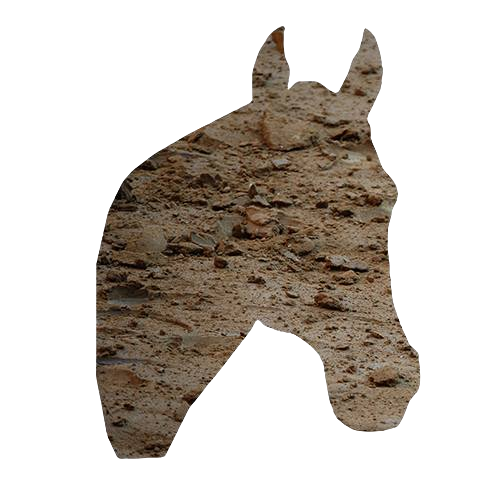www.thepalio.eu - dal Belgio con amore
Torre
Summary
| Colors | Bordeaux with blue and white border |
| Symbol | Tower (elefant) |
| Flag | 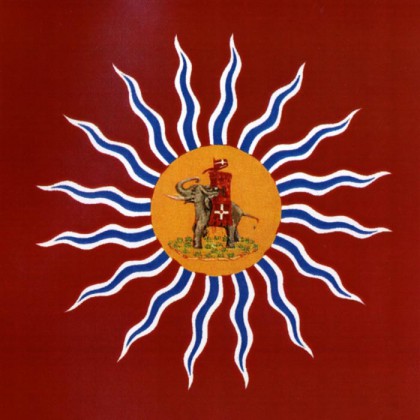 |
| Terzo | Terzo di San Martino |
| Headquarters | Via Salicotto 103 |
| Museum | Via Salicotto 103 |
| Clubhouse | Società “L’Elefante”, Via Salicotto |
| Contradaioli | Torraioli |
| Oratory | Chiesa di San Giacomo |
| Paitron Saint | S.Giacomo Apostolo (25 july) |
| Enemie(s) | Oca Onda (antecedente il 1599) |
| Allied contrade | Bruco (dal 1912) Chiocciola (dal 1689 al 1972) Leocorno (dal 1793 al 1980) Selva (dal 1790 al 1960) Tartuca (dal 1689 al 1933) |
| Victories | 45 officially recognized |
| Website | http://www.contradadellatorre.it |
Info
Territorium
The Bando di Violante di Baviera from 1730 determined the division of the city of Siena into 17 Contrade. People referred to buildings and their owners instead of the streets (as they do now). The document is still seen today as the basis on which the actual boundaries of the districts were determined.
Today, the following streets are part of the area’s territory:
- via di Salicotto
- via Rinaldini (part)
- Banchi di Sotto (part)
- piazza del Mercato (Siena) (part)
- via degli Archi
- via delle Logge del Papa (part)
- via del Porrione (part)
- via San Martino (part)
- via del Luparello
- via dei Malcontenti
- vicolo delle Scalelle
- vicolo del Contradino
- vicolo di Coda
- vicolo delle Scotte
- vicolo dell’Oro
- vicolo della Fortuna
- vicolo del Vannello
- vicolo della Manna
- via del Rialto

The former territory of the extinct Contrada della Spadaforte has also been partially included in Torre. The other piece is at Leocorno.

The former territory of the extinct Contrada della Vipera is also partially included in Torre. Vipera is the only Contrada Soppressa that would have won a Palio (1648), although not officially recognized but a Bufalata in which 4 neighborhoods participated.
History
After the victory of 1526 against the army of Clemente VII, the Sienese government decided to build a church dedicated to San Giacomo on the territory of the then Contrada del Lionfante (Leocorno + Torre) in the Salicotto part. The new church was entrusted to the residents of the neighborhood who had an elephant with a tower as their emblem. This later became the symbol of the neighborhood.
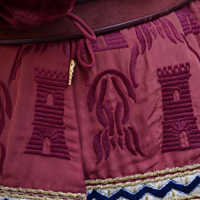
Important locations and Festa Titolare
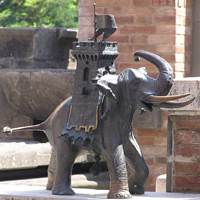
The Oratory of Torre, Chiesa di San Giacomo, was built in 1526 after the victory against the Florentines. Because it was mainly the men of the Salicotto neighborhood who excelled in that war, the church was built on their territory. Over the years she was passed on to the Contrada della Torre.
The baptismal fountain is in via Salicotti. Mario Berrettini built it in 1984 to replace that of Fausto Corsini from 1954. You can find it on the small square to the museum and the seat of the neighborhood.
The Festa Titolare in honor of patron saint S.Giacomo Apostolo is celebrated on July 25.
Torre and the Palio
Torre has 45 officially recognized victories. The last one was on July 2, 2015, with Andrea Mari (Brio) on Morosita Prima.
To date, Torre has twice won a Cappotto. The first in 1787, then in 1896.
Torre was in the past a neighborhood that could compete with enemy Oca for victories. Torre won 38 Palios until the end of the 19th century. Chiocciola arrived at the same number. Only Oca did slightly better with 42. Meanwhile (115 years later) the counter of Oca is at 65 and Torre at 45. The 20th was a great success for Oca that was in line with their previous centuries. For Torre, with only 5 wins in 100 years, it was a disaster. After the victory of ’61, no fewer than 44 years had to wait for a new victory in 2005. After these wins, it was 44 days (every day, I can testify) a celebration.
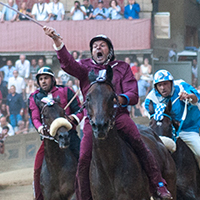
Anecdotes
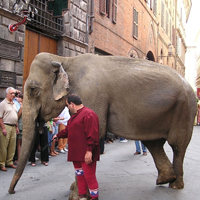
When Torre was finally able to win again in 2005 after waiting for 44 years, it was buzzing in the city for 2 weeks about whether or not a real elephant would participate in the victory procession (Corteo della Vittoria). Many people went early that afternoon to La Lizza where the procession was formed to see whether it was true or not. When suddenly a truck from a circus from Rome arrived , it became clear. There was an elephant.
The elephant was given a place at the front and opened the Corteo through the streets of Siena to the Piazza del Campo.
Rivalry with Oca
The rivalry between Oca and Torre is the only remaining rivalry between non-neighboring neighborhoods. It is also one of the oldest rivalries in Siena. Probably this, unlike others who argue about territory, arose from derailed arguments about economic interests in the struggle for the administration of the city.
The enmity was lifted to a higher level in the 19th century. Both neighborhoods in turn tried to bring in “Gobbo Saragiolo” (Francesco Santini) as a fantino. This top rider, who celebrated 15 victories, was not averse to bribery and defection. He was a very loyal mercenary who paid him enough. He won 3x for Oca and 5x for Torre.
Over the years, there have been various attempts at reconciliation between the two earthly rivals (the last dating from the early twentieth century), but never with success. For the torraioli, the enmity with Oca is the only one that really matters. The rivalry with neighbor Onda is one that is only recognized by Onda as enmity.
Rivalry with Onda
The rivalry between Onda and Torre is the oldest in the city and dates back to the 16th century.
Discussions about territory, as well as the very strong alliance between Oca (historic rival of Torre) and Onda (ended in 1966) were at the basis of this rivalry. This rivalry peaked in the mid-17th and early 18th centuries.
In 1641 Onda entrusted his horse to Torre. Despite the promise to give it back for the race, this did not happen and Torre de Palio won. Onda answered this insult by stealing a copper drum from Torre.
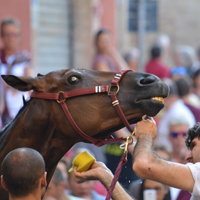
In the following decades it went from bad to worse. During the Palio of July 2, 1688, Torre’s fantino pulled the reins of Onda’s second Casato horse. In response, someone from Onda’s Corteo Storico killed Torre’s standard bearer. The Ondaiolo fled and could not be arrested for his act. The tension between the two neighborhoods increased and contradaioli from the other neighborhood were promptly thrown out of their homes and employees were fired if they were employed by someone of the enemy.
In 1713 a discussion followed between a ondaiolo and the captain of Torre. This ended with a knife stab from the ondaiolo. The angry torraioli promptly invaded Malborghetto to take revenge. Time to restore peace was thought in Siena. On 10 August of the same year, a notarial act signed a reconciliation that heralded the end of rivalry. As a symbolic gesture, Onda returned the stolen drum to Torre.
The contacts between the two neighborhoods became better. During the Palio of July 2, 1811, things got out of hand again. Torre was the first to cross the line, followed by Onda. A big fight ensued. The ondaioli claimed that Torre had only walked two rounds. Both districts went to Provenzano for the Te Deum. Only the next day was the Drappellone awarded to … Torre.
The rivalry between Onda and Torre is not a mutual one today. Onda regarded Torre as a real rival that must be stopped at all times. Torre, however, does not recognize the enmity with Onda and dismisses them as “a difficult neighbor”. Torre puts his energy in Oca, which can also be seen very clearly in the district’s victory tokens and books. There is only mockery with Oca.
A perfect illustration of this is the Palio of August 1972 when Onda won because of an error by Aceto that did not win for Oca. The torraioli celebrated Onda’s victory because earthly rival had lost Oca.
On the other hand, it was not so long ago (early 1980s) that Torre, after a bad loss, invaded Onda to be pelted with everything the ondaioli found to protect themselves. Pots and pans were thrown through the windows at the torraioli.
Victories
1
02/07/1652
Mone
?
2
02/07/1656
Mone
?
3
02/07/1657
Mone
?
4
02/07/1660
Pavolino
?
5
02/07/1665
Granchio
?
6
04/07/1684
Strega
?
7
02/07/1717
Strega
Gioia
8
17/08/1752
Checchino
falbo del Papi
9
05/07/1762
Checchino
castagno del Ricci
10
16/08/1764
Checchino
stornello del Falorsi
11
14/05/1767
Bastiancino
castagno del Ricci
12
02/07/1776
Batticulo
morello del Gambassi
13
02/07/1783
Biggeri
morello del Nepi
14
16/08/1784
Ciocio
cavallo
15
02/07/1787
Groppa Secca
sauro sfaccettato del Nepi
16
16/08/1787
Groppa Secca
baio dorato del Nepi
17
17/08/1795
Biggeri
morello del Baldini
18
16/08/1796
Biggeri
morello del Ceccarelli
19
14/05/1809
Biggeri
baio scuro del Manetti
20
02/07/1811
Pettiere
baio dorato del Ricci
21
17/08/1814
Ciccina
baio scuro del Pagliai
22
16/08/1816
Caino
baio dorato di Riccio
23
18/08/1822
Mugnaino
baio scuro del Pagliai
24
03/07/1825
Ciccina
morello del Felli
25
02/07/1829
Gobbo Saragiolo
morello bruciato del Coppi
26
16/08/1831
Il Brutto
baio dorato del Batazzi
27
17/08/1835
Gobbo Saragiolo
morello dello Iacopi
28
16/08/1839
Gobbo Saragiolo
morello del Buoni
29
16/08/1843
Gobbo Saragiolo
morello del Riccucci
30
03/07/1853
Gobbo Saragiolo
baio scuro del Bandini
31
17/08/1856
Figlio di Bonino
morello del Franci
32
15/08/1864
Pilesse
baio scuro dell’Amaddii
33
04/07/1875
Pilesse
storno del Pisani
34
16/08/1882
Il Moro
morello del Carlini
35
16/08/1893
Tabarre
Lampino
36
02/07/1895
Tabarre
Otello
37
02/07/1896
Scansino
Farfallino
38
25/08/1896
Scansino
Febo
39
16/08/1905
Fulmine
Gobba
40
13/09/1910
Moro
Gobba
41
16/08/1939
Ganascia
Giacchino
42
16/08/1947
Ganascia
Piero
43
16/08/1961
Vittorino
Salomè de Mores
44
16/08/2005
Trecciolino
Berio
45
02/07/2015
Brio
Morosita Prima
In addition, Torre grants itself 6 extra Palios, not recognized by the City of Siena:
- 25 luglio 1599: first bufalata senese, is assigned to Onda by a majority of sources, but Torre still puts them between hers (with fantino Nottolone)
- 2 settembre 1601: bufalata won with fantino Sgaraglia (o Sgaruglione)
- 2 settembre 1602: bufalata won with fantino Nottolone
- 15 settembre 1621: bufalata won with fantino Meio
- 15 settembre 1635: bufalata won with fantino Branchino (o Pacchino)
- 15 settembre 1640: bufalata won with fantino Santone
Images
Drappelloni and Numeri Unici
Drappellone and Numeri Unici can be found on pages on our Dutch website (pages will open in new tab) :
Debuting fantini
- Since July 2, 1775, 483 fantini debuted on the Piazza
- In 1928, no less than 9 fantini debuted (in 3 courses).
- 21 fantini won their debut.
- Torre had 27 fantini debut since 1775
- No less than 4 of them won their debut: Biggeri, Mugnaino I, Scansino II en Fulmine
- The longest period without a debutant is 28 years : 16/8/1946-2/7/1974
| 1 | Brecchino | 2/7/1778 |
| 2 | Biggeri | 2/7/1783 |
| 3 | Ticci Contadino | 2/7/1797 |
| 4 | Scricciolo | 2/7/1809 |
| 5 | Figlio Di Caino | 2/7/1821 |
| 6 | Mugnaino I | 18/8/1822 |
| 7 | Vetturale | 17/8/1827 |
| 8 | Boddino | 2/7/1833 |
| 9 | Romano III | 2/7/1846 |
| 10 | Burchielli Giuseppe | 15/8/1848 |
| 11 | Manciano | 4/7/1858 |
| 12 | Girocche | 2/7/1865 |
| 13 | Girolametto | 15/8/1872 |
| 14 | Mulatto | 16/8/1875 |
| 15 | Fiammifero | 16/8/1885 |
| 16 | Scansino II | 2/7/1896 |
| 17 | Fulmine | 16/8/1905 |
| 18 | Moro III | 16/8/1909 |
| 19 | Vigni Ugo | 2/7/1914 |
| 20 | Randellone | 2/7/1919 |
| 21 | Cucciolo | 2/7/1939 |
| 22 | Coscia | 16/8/1946 |
| 23 | Spillo | 2/7/1974 |
| 24 | Primula Rossa | 3/7/1978 |
| 25 | Rino | 2/7/1984 |
| 26 | Tremendo | 16/8/2009 |
| 27 | Amsicora | 2/7/2010 |
Never happened
Below you will find events that have never happened before and that cause some kind of superstition in the contradaioli. MAI or never is of course a relative term. The further we go back in time, the less data is stored and the more uncertain we become.
Torre has never :
- won a july palio in the 20th century
- won riding together with Aquila and Leocorno, Aquila and Nicchio, Bruco and Chiocciola, Bruco and Leocorno, Giraffa and Nicchio, Lupa and Nicchio
- won when they were selected as 3rd, 4th, 6th, 7th or 8th (estrazione)
- won from position 2, 3, 7 or 8 at the start
- on standing next to Chiocciola or Giraffa or Istrice or Leocorno or Selva or Tartuca or Valdimontone at the start
- won an august palio after being extracted together with Chiocciola or Drago or Giraffa or Lupa or Onda or Tartuca
- won a palio alla romana
- won a palio with cavalli scossi
- won a palio when Bruco, Civetta, Nicchio or Onda was the rincorsa
Last update : 13 december 2019
